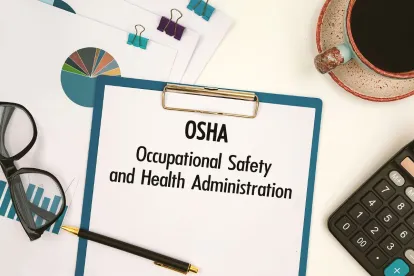Are employers at risk in their ability to conduct lawful post-accident drug and alcohol tests?
Maybe.
At least that is the answer for the many employers who are subject to the Occupational Safety and Health Administration’s recordkeeping rule (29 CFR Part 1904).
OSHA, in a “Supplemental Notice of Proposed Rulemaking” published recently in the Federal Register, announced that it is considering clarifying a requirement that employee reporting of occupational injuries and illnesses be “reasonable and not unduly burdensome,” by prohibiting employers from disciplining or taking “adverse action” against employees for reporting injuries and illnesses to their employers under the recordkeeping rule.
In public meetings conducted by the agency on its original proposed change to the recordkeeping rule (mandating electronic recordkeeping and posting of employer data on OSHA’s website), OSHA recounted, “Adverse action mentioned by participants included … requiring an employee who reported an injury to undergo drug testing where there was no reason to suspect drug use….” OSHA has invited further comment on the “kinds of adverse actions that might lead an employee to decide not to report an injury or illness,” and thus make such data less reliable. OSHA would make it a violation for an employer to discourage reporting of an injury or illness by an employee in this manner.
Injuries, however, generally are a result of workplace accidents. Were such a rule adopted, many employers — including those in high risk industries who have the greatest reason to conduct post-accident testing — could be limited to substance abuse tests post-accident based only on reasonable suspicion, at least where an injury is reported.
OSHA does not concern itself with a problem that arises frequently where supervisors cannot observe the employee immediately prior to the event causing injury, and so, as a practical matter, may be unable to establish reasonable suspicion, as the comment suggests should be required. Yet, a drug or alcohol test still may be warranted. Neither does the agency address exactly how it would define “reasonable suspicion,” whether “reason to suspect drug use” may be based on an employee’s causation of an accident, even in part, by an act of commission or omission, or whether agency compliance officers would defer to employer decisions as to the existence of reasonable suspicion.
One concern is whether OSHA compliance officers, focused on conventional workplace hazards, might dismiss too quickly any finding of reasonable suspicion where, for example, a machine guarding issue was detected on the same equipment involved in the injury-producing accident. The presence of an alleged hazard does not mean the employee was not also impaired at the time of the accident and that the impairment may not have played a part in causing injury.
Then there is the matter of existing state testing laws. Many states have passed them, often with the specific intention of reducing workplace injuries and workers’ compensation costs. In Minnesota, for instance, which since 1987 has had a “mandatory” law applicable to any employment-related drug testing conducted in the state, reasonable suspicion testing, among other things, may be established where “the employee sustained a personal injury, as that term is defined [elsewhere in the law], or has caused another employee to sustain a personal injury,” or where an employee “has caused a work-related accident or was operating or helping to operate machinery, equipment or vehicles involving a work-related accident.” (Minn. Stat. §181.951(subd. 5)). And in Florida, which has a “voluntary” drug testing law to which employers must adhere if they wish to benefit from a reduction in their workers compensation insurance premiums, reasonable suspicion also may be based upon “Information that an employee has caused, contributed to, or been involved in an accident while at work.” (Fla. Stat. §440.102(1)(n)(5)). A covered accident is not excluded because it happens to result in injury to the employee.
Does OSHA seek to undermine these “reasonable suspicion” testing laws, and others, in a professed effort to “protect the integrity” of its recordkeeping data, while increasing the risk that employees who are using drugs illegally or are impaired by alcohol will escape detection and continue to work, even after an accident has taken place resulting in harm? (Not all post-accident testing is based on resulting injury.)
OSHA is accepting comments on its proposed rule, as supplemented, through October 14, 2014. We will keep you advised of developments.




 />i
/>i

